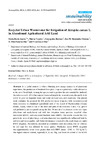Identificador persistente para citar o vincular este elemento:
https://accedacris.ulpgc.es/jspui/handle/10553/44371
| Título: | Recycled urban wastewater for irrigation of Jatropha curcas L. in abandoned agricultural Arid Land | Autores/as: | Dorta-Santos, Maria Tejedor, Marisa Jiménez, Concepción Hernández-Moreno, Jose M. Palacios-Díaz, María del Pino Díaz, Francisco J. |
Clasificación UNESCO: | 310391 Uso (manejo) combinado del agua y fertilizantes 330810 Tecnología de aguas residuales |
Palabras clave: | Biodiesel Crop Non-Conventional Water Resources Marginal Soils |
Fecha de publicación: | 2014 | Publicación seriada: | Sustainability (Switzerland) | Resumen: | In a global context in which obtaining new energy sources is of paramount importance, the production of biodiesel from plant crops is a potentially viable alternative to the use of fossil fuels. Among the species used to produce the raw material for biodiesel, Jatropha curcas L. (JCL) has enjoyed increased popularity in recent years, due partly to its ability to grow in degraded zones and under arid and semi-arid conditions. The present study evaluates the potential for JCL production under irrigation with non-conventional water resources in abandoned agricultural soils of the island of Fuerteventura (Canary Islands, Spain), which is one of the most arid parts of the European Union. JCL growth and productivity are compared during the first 39 months of cultivation in two soil types (clay-loam and sandy-loam) and with two irrigation water qualities: recycled urban wastewater (RWW) and desalinated brackish water (DBW). The results indicate that JCL growth (in terms of plant height and stem diameter) was significantly influenced both by soil type and water quality, with better development observed in the sandy-loam soil under RWW irrigation. Productivity, measured as cumulative seed production, was not affected by soil type but was affected by water quality. Production under RWW irrigation was approximately seven times greater than with DBW (mean similar to 2142 vs. 322 kgha(-1)). The higher nutrient content, especially P, K and Mg, and lower B content of the RWW were found to be key factors in the greater productivity observed under irrigation with this type of water. | URI: | https://accedacris.ulpgc.es/handle/10553/44371 | ISSN: | 2071-1050 | DOI: | 10.3390/su6106902 | Fuente: | Sustainability [ISSN 2071-1050], v. 6 (10), p. 6902-6924, (Octubre 2014) |
| Colección: | Artículos |
Citas SCOPUSTM
22
actualizado el 08-jun-2025
Citas de WEB OF SCIENCETM
Citations
16
actualizado el 01-feb-2026
Visitas 10
276
actualizado el 15-ene-2026
Descargas
98
actualizado el 15-ene-2026
Google ScholarTM
Verifica
Altmetric
Comparte
Exporta metadatos
Los elementos en ULPGC accedaCRIS están protegidos por derechos de autor con todos los derechos reservados, a menos que se indique lo contrario.
